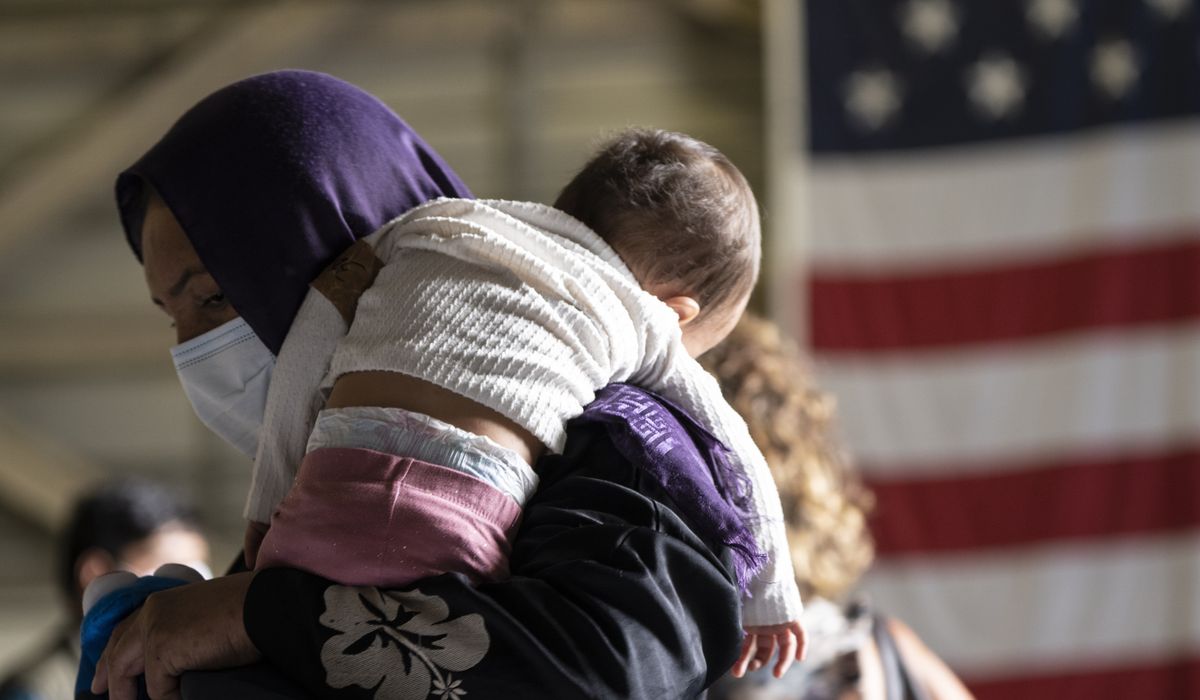

The U.S. is holding about 20,000 Afghan evacuees on American soil, the Pentagon said Wednesday, with tens of thousands more reportedly at overseas U.S. military bases hoping for eventual entry.
Afghans in the U.S. are spread across eight military bases, Gen. Mark A. Milley, chairman of the Joint Chiefs of Staff, told reporters Wednesday. Another 23,000 are being held at bases in four European countries, and 20,000 more are in other countries, generally in the Middle East.
Many of those are likely headed for the U.S., too. The bases here have capacity to hold about 30,000 people, but the military has been told to expand that to 50,000, the White House said.
At Fort McCoy in Wisconsin, which was holding about 3,000 people over the weekend, capacity was slated for 10,000. The base was told to prepare for 13,000, said Rep. Thomas P. Tiffany, a Wisconsin Republican who visited Fort McCoy last week.
“It deeply concerns me that are they going to overcrowd the base and all the attendant things that can go with that,” the lawmaker told The Washington Times.
He said Americans were told that the evacuation mission was about helping Afghans who assisted the U.S. war effort and were eligible for a special visa. But it appears almost all of those in the U.S. now have been brought under what is known as parole, a special power of the homeland security secretary to admit people for humanitarian or national interest reasons.
“They have so many people, and this is so poorly planned, that they’re just trying to find a home for everybody they’re trying to bring to the United States,” he said.
Mr. Tiffany said the Afghans should be held in a safe third country until their special visas are processed.
Biden administration officials said they evacuated more than 120,000 people from Afghanistan from mid-July until the end of U.S. operations on Monday. The administration has been tight-lipped about who is in that mass of people.
Gen. Milley’s revelation began to bring some clarity, with 20,000 Afghans on U.S. soil.
By paroling them in the U.S., the Biden administration has cut significant corners in what would have been their usual path.
The Afghans are no longer considered refugees because they are in the U.S. Some may be processed for the special visa, and others could ask for asylum, which is similar to refugee status.
Arriving without refugee status means the Afghans have less immediate support. They are unlikely to qualify for Medicaid or food stamps, for example.
Nonprofits across the U.S. are issuing calls for donations of money and housing supplies and receiving “overwhelming” responses.
Some have even urged donors to slow down to give the organizations a chance to sort through what they have.
Parolees can apply for work permits from the Department of Homeland Security. Work permits bring some benefits, such as eligibility for income tax credits.
Fort McCoy discourages migrants from leaving but can’t stop those who are determined, Mr. Tiffany told The Times.
CBS reported that the base expects processing to take 14 to 21 days.
Mr. Tiffany said Congress should have a role in the process and numbers, but he noted that it’s not likely with Democrats controlling Congress and backing President Biden.
“There’s a lot of holes in the system, and the Biden administration is clearly trying to do this fast and not right,” he said.
Biden administration officials say Afghans overseas are subject to background checks before they are brought to the U.S.
“I can absolutely assure you that no one is coming into the United States of America who has not been through a thorough screening and background check process,” White House spokeswoman Jen Psaki told reporters on Wednesday.
But The Washington Times reported this week about an Afghan man flown to the U.S. who had a rape conviction and deportation in his history. He reached Washington Dulles International Airport before Customs and Border Protection flagged him.
The man was spotted because his rape conviction was in the U.S., where he was living before his deportation.
Mark Krikorian, executive director at the Center for Immigration Studies, said vetting of others will be tougher. The U.S. now lacks access to information in Afghanistan because of the Taliban takeover.
In a column for National Review, Mr. Krikorian said those who reach the U.S. are unlikely to be sent back regardless of their backgrounds.
“Every Afghan we extracted from Kabul will be able to live here for the rest of his life, even if the Afghan refugee commits crimes after his arrival,” Mr. Krikorian wrote.
